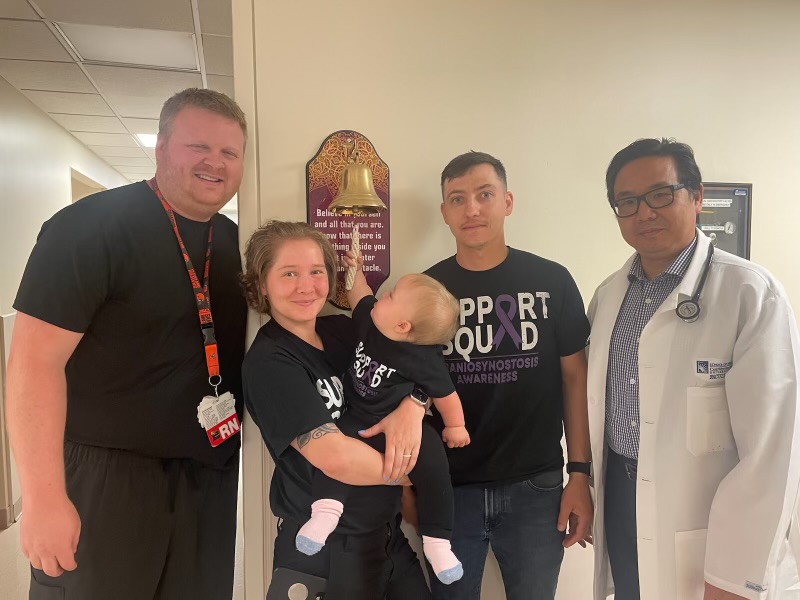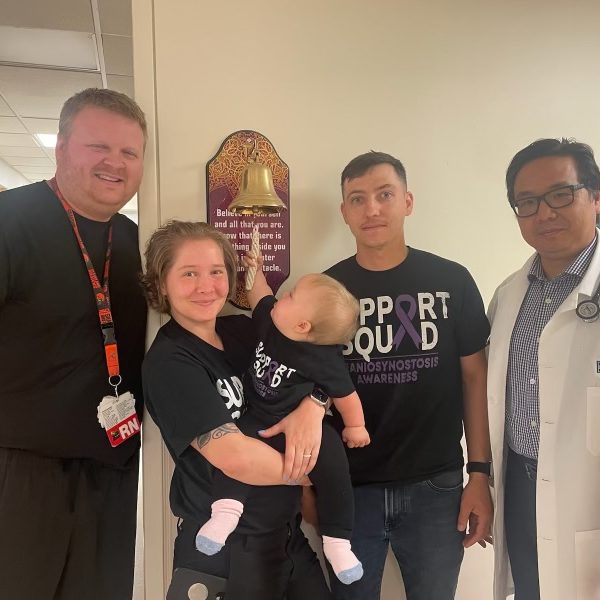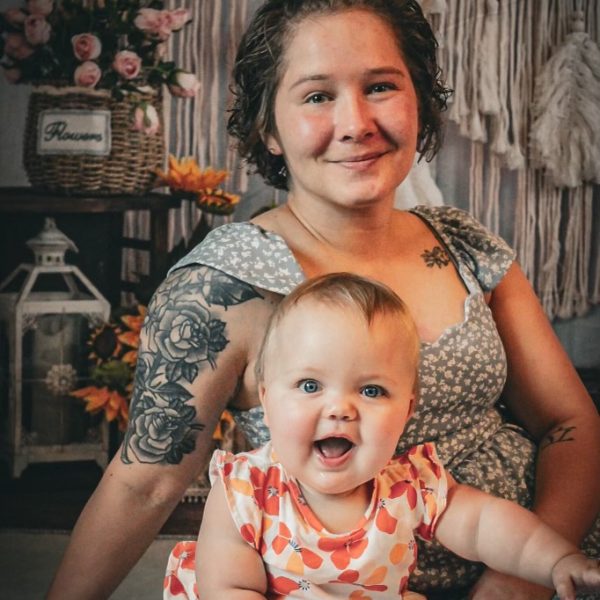“Hold pressure, hold pressure,” someone yelled. Then Megan Arena heard the word “transfusion” and saw the sheet under her was soaked in blood.
I’m going to bleed out, she thought. This is it.
Her mom was in the room now, at Megan’s side, holding her hand as doctors completed the bone marrow biopsy.
“You’re doing good,” Tina Arena whispered to her 26-year-old daughter. “You’re doing good. Everything’s going to be OK.”
Everything wasn’t OK.
The bleeding confirmed what doctors suspected. Megan Arena had leukemia. In her case, a rare and vicious form of blood cancer called APL, acute promyelocytic leukemia. With only hundreds of cases a year in the United States, few doctors are experienced in treating it in early pregnancy. And Megan was 22 weeks pregnant.
She was also at MetroHealth, which two years earlier had hired William Tse, MD, a well-trained clinical expert in leukemia and other blood disorders, along with a team of talented cancer researchers committed to providing the most advanced treatment to everyone in the community, especially those who might not have had access in the past.
Immediately, Megan was admitted to MetroHealth’s Intensive Care Unit, and Dr. Tse was at her bedside overseeing her care along with MetroHealth intensive care specialist Yasir Tarabichi, MD, and the Maternal-Fetal Medicine (High-Risk Obstetrics), Nephrology and Medical ICU teams.
Together, their hope was to stabilize Megan’s life-threatening bleeding, treat her cancer, save her life and save the life of her baby.
Dr. Tse knew from the minute he saw Megan there was no guarantee he could save them both. Megan was pale and her heart was close to failing. She struggled to breathe, even on high-flow oxygen, which meant she might need a ventilator, and her kidney function was deteriorating so fast a dialysis machine was moved into her hospital room. Once acute leukemia patients are put on breathing and dialysis machines, their outcomes are dismal.
For God’s sake, Dr. Tse thought. We’re talking about two lives here, not one.
At this point, the conventional chemotherapy treatment for Megan’s leukemia could result in massive bleeding, complete organ failure and death for Megan and her little girl.
But Dr. Tse knew of another option. Which is why, there in the ICU, while Megan drifted in and out of sleep, and relative after relative came to visit, he decided instead to start a so-called “differentiation” treatment that would quickly induce maturation of the leukemia cells and allow the chemotherapy to work without causing detrimental bleeding.
With that one pill, Megan’s circulation began improving within 24 hours. Her baby was less stressed, too. And her husband, Anthony Boyd, who’d been by her side every day in the Intensive Care Unit, speaking for Megan – and their baby – when Megan couldn’t, could finally relax a bit.
Three days later, the life-threatening bleeding was under control. After five days, Megan was well enough to start the chemotherapy that would control her leukemia.
Four weeks after that, Dr. Tse performed another bone-marrow biopsy.
The cancer was under control. But the battle wasn’t over.
Should they deliver the baby early, when it wasn’t fully developed so they could stop the threat of a recurrence? Or wait for the baby to grow and risk losing the battle with the leukemia?
Dr. Tse knew the leukemia could recur without continuous treatment, but that treatment could damage Megan’s heart and affect the baby’s growth.
Those questions were at the heart of a series of intense consultations between Dr. Tse and every member of MetroHealth’s Maternal-Fetal Medicine Team as well as the Neonatal Intensive Care Team, led by Prabhu Parimi, MD, as they worked together to save Megan’s life and her baby’s.
Finally, they reached a compromise. And on August 18, 34 weeks into her pregnancy, MetroHealth OB-GYN Jessica Pippen, MD, delivered Megan’s baby girl. Lena weighed just 4 pounds, 11 ounces, but she was perfectly healthy – with no leukemia.
Megan’s been home ever since. She headed back to work a few months later. And Dr. Tse began new drug combinations that would cure the leukemia, drugs he couldn’t use before because they could harm the baby.
Megan completed that treatment in May and had another bone marrow biopsy on June 13, this one without complications. Dr. Tse shared the results with Megan the following week.
The leukemia is gone.
Now Megan and her husband will celebrate two lives on August 18, when Lena, surrounded by family and friends, turns 1.
“This was definitely the hardest year of my life,” Megan says. “But I’m very grateful to still be here – and to see my baby grow.”
She pauses for a moment, then continues.
“I’m just happy to be here,” she says.
Oncology nurse Ryan Dedinsky; Megan Arena; her husband, Anthony Boyd; and Dr. William Tse gathered on June 22 as baby Lena rang the celebratory bell signifying the end of Megan’s cancer treatment.
“I also want to thank all my nurses who were so caring through this entire process,” Megan Arena says. “From the ICU nurses to the cancer floor nurses to the nurses in labor and delivery holding my hand while I was terrified and talking me through everything and, lastly, my outpatient cancer care nurses. They have become my friends and are the best nurses I could have asked for. I don’t think I would have made it without them.”
Advanced Cancer Treatment – For All
Megan Arena’s life-saving treatment is just one example of the sophisticated care MetroHealth now provides after years of advancing its cancer program. The goal of the public health system’s cancer initiative has always been clear: to ensure all Cleveland-area patients, including underserved communities, have access to the best possible treatment for cancer, which kills more than 600,000 people in the United States every year.
A 2021 study of MetroHealth’s cancer patients found that 43% were from households earning less than $38,000 a year; 40% were underrepresented minorities; a third lacked food, housing or social connections; and 32% were underinsured or uninsured. For many of these patients, traveling across the country for care is an impossible burden.
In 2021, MetroHealth was already taking the necessary steps to bring innovative cancer therapies to all of its patients, including the socially and economically vulnerable populations that safety net hospitals often care for.
In March of that year, the health system announced a new cancer research team that included Dr. Tse. That same month, MetroHealth began operating its new linear accelerator, which targets tumors without damaging healthy tissue around them. That year, as well, MetroHealth became a member of the National Center for Regenerative Medicine, a leader in cellular manufacturing for immunotherapy and regenerative medicine. The center, based at Case Western Reserve University and operated by the university, Cleveland Clinic and University Hospitals, focuses on research leading to the discovery of stem cell and other cell-based therapies to improve patient outcomes.
In March 2022, MetroHealth also began building a state-of-the-art vector and cellular products Good Manufacturing Practice (GMP) facility on its main campus to enable the quick, reliable production and processing of cutting-edge immunotherapies from A to Z, including CAR-T, tumor-infiltrating lymphocytes (TIL) and mesenchymal stem (MSC) cells. CAR-T cell therapy is a highly effective cancer therapy that combines cellular, gene and immunotherapy – a triple-threat cancer warrior that trains a patient’s blood cells to recognize and kill cancer cells.
This personalized and precise method of using a patient’s own cells to beat cancer greatly reduces the traditional chemotherapy and radiation therapy-related toxicities such as hair loss, nausea and other side effects. TIL and MSC also allow doctors to treat cancer more effectively with fewer side effects. The production facility opened March 30, making MetroHealth the first safety-net hospital in the United States to offer in-house viral vector and cellular production for a wide spectrum of medical treatments.
MetroHealth also added a Blood and Marrow Transplant Unit to the Glick Center, its new main-campus hospital, which opened in November 2022.
“Many of these innovation initiatives allow The MetroHealth System to continue as one of the nation’s leaders in medical advancements,” Dr. Tse said, “and to make cutting-edge medical research, screening and cancer treatment available to a large, diverse population and, in many cases, to patients who haven’t had access in the past.
“Health care must be recognized as a right,” he said, “and not a privilege.”














